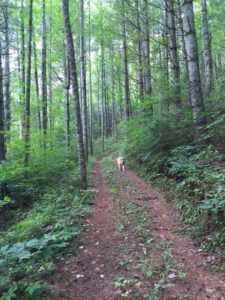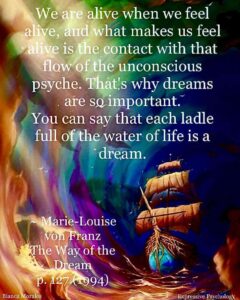
A Lesson on Aging
I’m so happy to be back in the mountains. I love the weather, the trees, the birds, the rushing creek, the flowering bushes. The beauty.
 This weekend I was honored by a fellow writer, aficionado of Jungian psychology, and advocate for social change. Skip Conover, founder of the website Archetype in Action, notified me that he had started a new Facebook page with the engaging title “The Rabbi, the Novelist, the Dreamer, the Revolutionary and the Marine Walked into a Bar…” And he had made me an administrator.
This weekend I was honored by a fellow writer, aficionado of Jungian psychology, and advocate for social change. Skip Conover, founder of the website Archetype in Action, notified me that he had started a new Facebook page with the engaging title “The Rabbi, the Novelist, the Dreamer, the Revolutionary and the Marine Walked into a Bar…” And he had made me an administrator.
I’m so happy to be back in the mountains. I love the weather, the trees, the birds, the rushing creek, the flowering bushes. The beauty.

Hello friends. Yes, I’m very alive and well. And having some fascinating dreams. I hope you are too. For the last few months I’ve been

“The gigantic catastrophes that threaten us today are not elemental happenings of a physical or biological order, but psychic events. To a quite terrifying degree
Website design and development by Chad Lieberman
0 Responses
I tried to see if I could find the group on FB but I think it may be a secret one so doesn’t show up on search. I’d be very interested to see it and perhaps join.
Hi Viv, try entering these terms and see what you come up with: Rabbi, Novelist, Dreamer, Revolutionary, and Iconoclast Walked into a Bar. Skip has been fiddling with the title, but has actually changed Iconoclast back to Marine. It’s a public page and you can ask to be a member if you want to. With my enormous, newfound power as administrator 😉 I can now grant your request!! Just call me Magic Jeanie!!
BRAVO and congratulations to one of my favorite Dreamers.
Thanks, Sally! It’s great to hear from you, sister Dreamer.
I must say, Jean, I have never liked that John Lennon song because I could never get over the “No religion too” part. But I do love the way you think and write, and I eagerly look forward to learning more from you!
I understand. I felt the same way for a long time. But I don’t think that by “No religion too” he was saying that having a religious attitude and finding spiritual comfort and inspiration in worship and rituals with like-minded people was bad. He was associating “religion” with the many wars and injustices inflicted on innocent people through the ages by narrow-minded and fanatical followers of some organized religions. I expect he may have received more than a few slings and arrows from self-righteous and unloving so-called “religious” people in his time and was reacting against that particular brand of religiosity. I know you know this, of course. But I thought it might be a good idea to say it here for readers who may not have thought this through.
I went through a period of being angry with “organized religion” myself because despite all my spiritual yearning and earnest service to my church and requests for help from religious leaders, the only hope they provided was in conformity to rather orthodox “correct belief.” One priest told me that I just needed to think positively. He had no understanding of metaphors and archetypal truths and his surface solution, i.e. using will power to change my attitude, was of no help whatsoever to me. I got to the point that I couldn’t attend services without resentment and stomach aches!! This was just me and my somewhat conservative church, of course. I was opening wounds that still had not been healed and had to go through this phase before I could understand the truths beneath all religions and forgive those who didn’t understand them.
Thank you for writing, Stephen
Thank you for your wisdom on this, Jean. It is so important for us to really listen to what people tell us before giving them “the word.”
I agree. Sometimes I think dialogues are more about listening and reflecting than speaking.
A favorite story, Jean (like the Cherokee) G-d gave us 2 ears but only 1 mouth so we would listen twice as much as we speak.
Love it! Thanks.
Many thanks for these kind thoughts, Jean Raffa. You’ll have to forgive the Rabbi! (;-) Last Thursday he fell down some musty old stairs into Dr. Jung’s sub-basement, and it may take him a while for his eyes to adjust to the light. As Dr. Jung noted, “The other gods died of their temporality, yet the supreme meaning never dies, it turns into meaning and then into absurdity, and out of the fire and blood of their collision the supreme meaning rises up rejuvenated anew.” C.G. Jung, The Red Book (Reader’s Edition), P. 120. http://youtu.be/WJ25Ai__FYU
Look at you with the perfect Jungian quote at your fingertips!!! 🙂 What a treasure you are. Thanks so much for opening this new page and kindly including me in it. I adore serious (and not so serious) dialogues like this. I especially love that we’re all philosophers here! I’ve been looking for people like this to talk to since I was 18 and discovered the pleasures of sharing philosophical perspectives with a boy I briefly dated. He enjoyed it as much as me; but unfortunately (for him—I think he was a bit smitten), this was the only hook he had for my Animus projection and it wasn’t nearly enough for me!!
Thank you Jean. I think the baby boomers were exposed to so much in the 60’s in full on collison with their parents’ generation that the struggles have been deep yet very meaningful ones. Also, if we can keep imagining, the world will indeed be a better one.
Thank you, Susan. You bring up a very interesting point about the 60’s collision of differing cultural values. I think the struggle ended up being so deep and meaningful because at bottom it reflected the archetypal battle between good and evil that goes on in us all the time. The collective consciousness of Americans had long identified with the “good guy” side of the social spectrum while blithely ignoring our culture’s inevitable shadow underbelly: i.e. racism, sexism, materialism, imperialism, and lots of other “isms.” Collective consciousness was understandably shocked and outraged to have all this dredged up, so much so that a large sector of the population is still in total denial. No person or culture welcomes awareness of its shadow, although this is essential for healthy growth. Blessings.
Thank you Jean for a clear exposition of the dynamics which applies to South Africa where I live, now in its 21st year of democracy post apartheid. There is so much denial it is unbelievable … and at times everything in our beautiful country seems hopeless.
I’m so sorry. I expect it will take a few generations of democracy before the improvements are more permanent and visible. I think about the U.S.’s declaration of independence and what hope that brought for justice, only to have the nation become split apart by a Civil War over a new set of denials and injustices within the next 100 years. True growth and change, both in individuals and in societies, seems to take place in baby steps, so I take comfort in taking the long view into the past to remember that change is happening and trust that it will continue to happen in the future. May it continue to be so.
My friend Brian Carlin, a Scottish poet, is having problems posting comments here so he sent them to me via email. Here are his thoughts:
“The dreams and dreamers we were sold through our culture, from Shakespeare to the Everlys,
were of their nature other-worldly, airy-fairy fluff, and by implication disconnected and unreal. Time to reclaim the definition perhaps for the thoughtful, the insightful , those who are attempting to stitch together all the realms of our senses. Yes Jeanie Raffa…big, big dreamer!”
Thank you, Brian. I love your assertion that it’s time to reclaim the definition of “dreamer” to include and highlight its many positive virtues. This is another of those words—like “liberal,” “feminist,” “different,” “emotional,” “introverted” and “crone” — that has been subtly undermined by the left-brained preferences which have dominated Western culture for so long. I especially love your phrase, “attempting to stitch together all the realms of our senses.” You certainly have a way with words!
Emily Dickinson said, “Hope is the thing with feathers that perches in the soul, and sings the tune without the words, and never stops at all….”
That seems to embody the essence of dreams. And who better to represent the Dreamer than you, Jean? Here’s the phrase swirling in my mind: I Dream with Jeannie…
I love it! To continue the song swirling in your mind, “…of the silver-white hair.” 🙂
Your Dickinson quote is truly a perfect description of dreams. They have a substance and song of their own that is as real and essential to living as are the outward physical aspects of life with which we tend to identify. And they sing their songs to us every night, lovingly, faithfully, whether we listen or not, without ever giving up on us.
Synchronistically, I’m in the midst of recording “Dream a Little Dream of Me” with my ukulele teacher on his Garage Band app on his iPad! He plays a mean guitar background and I play my ukulele and sing. He’ll send me a finished version soon and If I can get up the nerve, maybe I’ll provide a link to it here one of these days!!
Thank you for your sweet and comforting comment. Jeanie
I love John Lennon (for all his feet of clay). In ‘Oh Yoko’ how he sings “In the middle of a dream I call your name…my love will turn you on…” Dreaming and love. And how he expressed it all to the real world of alternate social structures. And his dear friend spiritual George Harrison becoming a ukelele devotee.
it seems you’re harmoniously connected to the counter-culture/dream-culture alive in Beatles music.
I love how you make dreams seem so alive.
No way! I had no idea George Harrison (always my favorite Beatle) developed a passion for the ukulele! Did he ever record a song playing it? I always knew we must have something in common…..must be that soul-satisfying “harmonious stream of the counter-culture/dream-culture.” I’m learning to play “Imagine” now. I find it haunting. Glad to know I make dreams seem alive. Awake or sleeping, they are utterly real to me.
Yes, George did record with the ukelele. Some nice material. Look forward to hearing your version of Imagine!
Exciting, Jean. I followed your link and just joined the new FB page. You, my friend, are a dreamer while I was a pot-smoking, Vietnam-war protesting, encounter group leading, folk-song singing, Jung studying, autoharp playing, flower child with dreams. Now I’ll settle for just being a Dreamer.
I think you had way more fun than I did! Let’s switch places in our next lives! 🙂